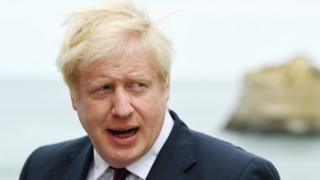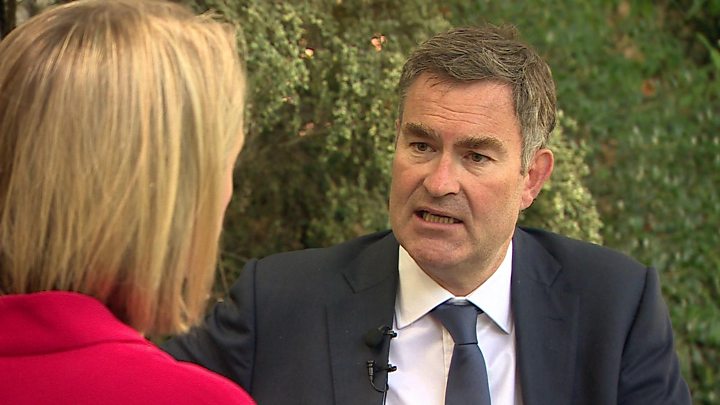Brexit: UK negotiators ‘to step up tempo’ on new deal talks
 Image copyright Getty Images
Image copyright Getty Images Boris Johnson has promised a renewed effort to secure a deal with the EU before the Brexit deadline.
The UK’s Brexit negotiators will now meet their EU counterparts twice a week next month, in the run-up to a crucial summit on 17 to 18 October.
It follows a backlash from MPs and opponents of a no-deal Brexit against the prime minister’s decision to suspend Parliament next month.
The EU said it expected the UK to come up with “concrete proposals”.
A European Commission spokesperson said its “doors remain open” and insisted it had “demonstrated our willingness to work 24/7 throughout this long process”.
As things stand, the UK is due to leave the EU on 31 October with or without a “divorce” deal.
The previous government, under Theresa May, agreed a deal with the EU but it was rejected by MPs three times.
Mr Johnson says while he would prefer to reach a deal, he is willing to leave without one – and maintains the UK will leave by the October deadline “no ifs, no buts”.
Mr Johnson said he had been “encouraged” by the response from EU leaders but said “it is now time for both sides to step up the tempo”.
He also said he had seen “a willingness to talk about alternatives to the anti-democratic backstop”.
The backstop – a controversial back-up plan to prevent a hard border in Ireland if no post-Brexit trade deal is agreed – is likely to be at the forefront of the twice weekly discussions between Brussels and the prime minister’s lead negotiator, David Frost.
The government reiterated that a new deal would not be agreed unless the withdrawal agreement is reopened and the backstop taken out.
No 10 said the two sides “remain some distance apart on key issues” but added they were “willing to work hard to find a way through”.
On Wednesday, Mr Johnson asked the Queen to suspend Parliament for five weeks in September and October, saying he would outline his “very exciting agenda” in a Queen’s Speech on 14 October.
But several MPs argue the suspension is in fact designed to stop them from blocking a no-deal Brexit, by denying them enough time to debate.
What are MPs’ plans to stop no deal?
The former Justice Secretary David Gauke – who resigned over Mr Johnson’s openness to a no-deal Brexit – told the BBC next week could be MPs’ “only opportunity” to challenge no deal.

Media playback is unsupported on your device
Labour leader Jeremy Corbyn vowed to “challenge” Mr Johnson on what he described as “a smash and grab raid against our democracy”, when Parliament returns from recess on Tuesday.
Mr Corbyn added that tabling a no-confidence motion in the prime minister at an “appropriate moment” also remained an option.
Can the rebel alliance stop no-deal Brexit?
Within days we will know if the MPs who are implacably opposed to leaving the EU without a deal can really stop that happening.
With lots of former ministers on the backbenches, the group which is openly fighting against the possibility of leaving the EU without a deal has a different complexion.
And the opposition parties, including the Labour leadership, now appear fully engaged in next week’s plan.
But given Boris Johnson’s main reason for success in the Tory leadership election was to leave the EU whatever it takes at the end of October, it is a pretty major goal for a group of backbenchers and opposition politicians.
BBC Newsnight’s political editor Nick Watt said a cross-party group of MPs was planning a “surgical strike” to change the law and ban the UK from leaving without a deal.
Because of the tight deadline, with only two working days before Mr Johnson is expected to suspend Parliament, it would involve an emergency debate on Tuesday and a vote to take control of the Commons agenda the following day.
That could prevent Chancellor Sajid Javid from carrying out his spending review, scheduled for Wednesday.
It is also thought some MPs are exploring ways of ensuring Parliament can meet on the Friday, Saturday and Sunday before the planned suspension.
Our correspondent said one possibility was a one-line amendment to the Withdrawal Act, saying the UK can only leave the EU with a deal in place.
The plan also faces challenges in the House of Lords, where Brexiteers could table multiple amendments as a delaying tactic until the shutdown begins, he said.
However, Lord Lisvane, the former clerk of the House of Commons, told BBC Radio 4 he believed the Lords “would be very cautious about seeking to kill a bill which had actually been passed by an elected house”.
What have other parties said?
Labour, the SNP, the Lib Dems, Plaid Cymru, the Independent Group for Change and the Green Party have released a joint statement condemning the “undemocratic actions” of Mr Johnson and calling for the suspension – which it says is the “longest prorogation in recent history” – to be reversed immediately.
“The prime minister is shutting down Parliament with the sole aim of stopping MPs from avoiding a no-deal Brexit,” it said.

Media playback is unsupported on your device
Leader of the DUP Arlene Foster, however, welcomed the decision but said the terms of her party’s agreement with the Conservatives would now be reviewed.
Mr Johnson has a working majority in Parliament of one and support from the DUP keeps the Conservative Party in power.
What other reaction has there been?
Some Tories have also objected to the five-week suspension, with government whip Lord Young resigning in protest.
Commons leader Jacob Rees-Mogg said this parliamentary session had been one of the longest in almost 400 years, so it was right to suspend it and start a new session and outrage at the plan was “phoney”.
But Ruth Fox – director of parliamentary experts the Hansard Society – said this prorogation was “significantly longer than we would normally have” to start a new parliamentary session.
Lord Lisvane said he believed the government had acted improperly.
“If you prevent Parliament from taking a decision or expressing a view because you think it won’t be to your taste, that’s a pretty profound subversion of the relationship between government and Parliament,” he said.
In Scotland a judge is considering a legal attempt brought by parliamentarians to block Parliament’s suspension. His decision is due at 10:00 BST on Friday.
The planned suspension also triggered protests across the country, with further demonstrations expected this weekend.
Meanwhile, an e-petition on Parliament’s website against the suspension reached more than 1.5m signatures.




